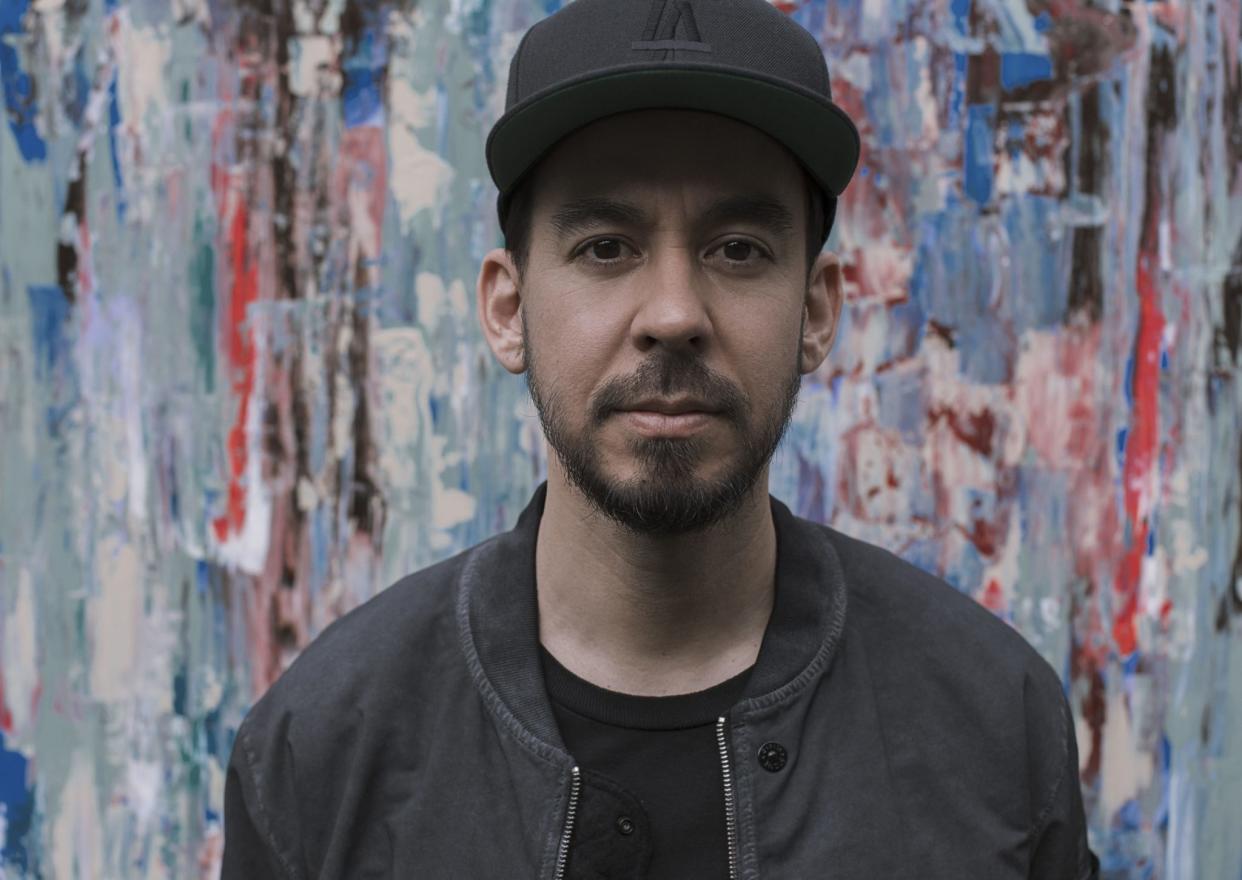Linkin Park's Mike Shinoda on how art aided his 'Post Traumatic' grieving process

When Linkin Park singer Chester Bennington died by suicide last year at age 41 — on the birthday of his good friend Chris Cornell, who’d taken his own life in a similar way just two months earlier — it shocked fans and friends around the world. But there has been one positive outcome: Bennington’s passing, along with the deaths of Cornell and other troubled musicians like Avicii, the Cranberries’ Dolores O’Riordan, Huntress frontwoman Jill Janus, and most recently Mac Miller, has helped raise awareness for mental health issues.
Bennington’s Linkin Park bandmate Mike Shinoda, whose new solo album Post Traumatic and its accompanying artwork was created in the aftermath of theBennington tragedy, has noticed the change in the national conversation, and he’s taking part. He and Bennington’s widow, Talinda, are set to appear in a suicide prevention PSA alongside the stars of ABC’s upcoming drama A Million Little Things, and this week Shinoda joined Stone Temple Pilots, Pearl Jam’s Mike McCready and Stone Gossard, Jared Leto, Alessia Cara, Bebe Rexha, Charlie Puth, Stephan Jenkins, and others for Entercom’s “I’m Listening” special on mental health advocacy and suicide prevention.
“I’m new to the subject [of mental health], at least in terms of the more academic descriptions and advice that people talk about or want to know about,” Shinoda tells Yahoo Entertainment during the week of World Suicide Prevention Day. “But I’ve learned things in the past year that I’ve been making an effort to share — in particular the idea that there’s this perceived difference between mental health and physical health. That’s something that we’re now starting to kind of take a look at and do away with. Like, the idea is that when you wake up in the morning and you feel like a part of your body hurts — say, your arm or your back — if it hurts a little bit, you might take it easy that day. If it hurts more, you might stay home from work or school. And if it hurts even more, then you might go to the doctor. Well, mental health is the same way: You can wake up and feel that something is not right and it hurts, and so you could take it easy that day. You could stay home. You could go to the doctor. And people need medicine; it’s nothing to be ashamed of. It’s all part of taking care of your health.”
Shinoda’s own self-care strategy while mourning the loss of his bandmate and friend was to immerse himself in his art — whether it was the writing and recording Post Traumatic or the creation of its artwork (three mixed-media canvases of which, including the album cover, will make their world premiere Sept. 27 at the Pop Art Photo Show at the Barker Hangar in Santa Monica, Calif.). “Whenever I’m dealing with something complex or difficult, I tend to gravitate towards making things — making art, making music. And this was no different,” he explains.


“In the beginning, I was just about putting stuff together, doodling on the canvases and just making things almost in a free-association kind of way, And those things turned into doing little something bigger,” Shinoda recalls. “It was actually similar with the music: In the beginning, I was in my studio at home and jamming, just playing anything to get used to the idea of doing it again. Because for a while I wasn’t doing it; I wasn’t comfortable going into the studio. And I knew that if I’d stayed away from it for too long, the anxiety would just keep building.”
Understandably, Shinoda describes the months following Bennington’s death as “a very confusing time” and says, “I think you can hear it in the music.” As a result, Post Traumatic, which is accompanied by visuals that Shinoda filmed, painted, and edited himself, is a sonic journey through the grieving process — thoughtfully sequenced, with heartbreaking tracks like “Watching As I Fall” and “Nothing Makes Sense Anymore” segueing into more optimistic tracks like “Hold It Together,” “World’s on Fire,” and the final farewell, “Can’t Hear You Now.”
“If you listen to the album the first, it’s 16 tracks, and the first half of it is more backwards-looking and darker,” notes Shinoda. “As it gets toward the middle, things start to point toward the future and become more hopeful. It’s funny — I was joking with somebody that maybe I should have released it as two albums. For some fans, they listen to the second half a lot more than the first.”
Now that Shinoda is touring to promote Post Traumatic, he’s keenly aware of maintaining that light/dark balance. “When I was putting the set together, I was approaching it from the perspective of a fan coming to a show,” he explains. “I knew I didn’t want them to come and see something sad. I wanted it to be an exciting show, and a fun show. Yes, to have substance and catharsis too, but I wouldn’t want to come to a show and just be dragged through bad crap the entire time. The set actually has a lot of different moods and a lot of different tones.”
The most emotional part of Shinoda’s set, of course, is when he plays Linkin Park’s angst-ridden signature song, “In the End.” Says Shinoda, “That’s always a moment for reflection and a bit of a tribute moment for Chester. It’s a meaningful part of the show. I’d feel weird not doing it, for sure. I think that it definitely gives a lot of fans — the ones who come for it — that kind of catharsis. It gives them that moment. But what I like about it is it doesn’t consume the whole show. That’s an important moment, but it’s not what the whole show is all about.”
As for what the future holds for Linkin Park — if they will continue as a band without Bennington — Shinoda simply says, “We don’t have any news at this point. When we do, of course we’ll share it with the fans online.” But the connection he shares with Linkin Park’s devoted fans — through his music, his visual art, and his ongoing discourse about suicide and mental health — is everlasting. “I hear stories from fans, whether it be that they were in trouble and the music helped them or, in some cases, that they just really connected with our music — or connected with Chester, or connected with me — and that helps them get through things.”
Read more from Yahoo Entertainment:
In the end: Remembering Chester Bennington’s troubled life through his most prescient lyrics
Chester Bennington remembered on birthday with moving mental health advocacy posts
Follow Lyndsey on Facebook, Twitter, Instagram, Google+, Amazon, Tumblr, Spotify
